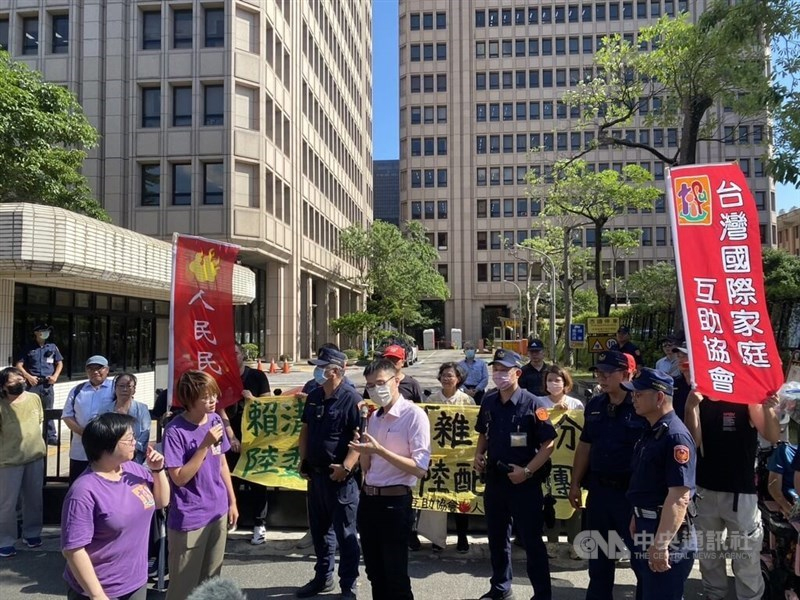In Taipei on Thursday, local civic groups and left-wing activists staged a rare protest against the Mainland Affairs Council (MAC), urging the agency to formally apologize for its enforcement of a long-dormant legal requirement: that Chinese spouses of Taiwanese citizens must provide proof of household deregistration in China in order to retain their legal status in Taiwan.
This demand stems from an April 2025 move by Taiwan’s National Immigration Agency (NIA), which began sending formal notices to around 12,000 Chinese spouses, asking them to submit deregistration documents from mainland Chinese authorities within three months. Those who fail to comply may lose their Taiwanese household registration and, in effect, their permanent residency or “Taiwan status.”
🎯 Context Behind the Controversy
The requirement originates from the Act Governing Relations Between the People of the Taiwan Area and the Mainland Area, which explicitly states that individuals who hold “Taiwan status” cannot simultaneously maintain a household registration in mainland China. This provision is based on the principle of legal separation between the two territories, a cornerstone of Taiwan’s sovereignty laws.
Despite this legal framework, the government has historically not enforced this particular clause strictly. That changed in 2024, when authorities began proactively verifying the status of individuals who had been granted household registration in Taiwan but were suspected of still being officially registered in China.
🪧 Protests and Public Sentiment
The Taiwan International Family Association (TIFA) and the People’s Democratic Party led the demonstration, which drew around 20 protesters to the Joint Central Government Office Building in Taipei. Protesters called the move a “witch hunt” and “discriminatory” against Chinese spouses, many of whom have been living in Taiwan for over a decade, contributing to society, raising families, and working legally.
The groups released a statement saying:
“It is unjust to suddenly enforce this rule retroactively without acknowledging that it was the government’s own decision not to implement it earlier. Now families are being punished for that administrative oversight.”
🏛️ Government Response: Legal Obligation, Not Discrimination
MAC Deputy Minister and spokesperson Liang Wen-chieh (梁文傑) held a press conference later that day to respond to the criticism. He asserted that:
- Over 130,000 out of the 140,000 Chinese spouses who received household registration have already submitted the required documents.
- The government is offering exemptions and deferrals for individuals with valid medical or humanitarian reasons.
- The measure is not punitive, but protective, ensuring that those who comply won’t face revocation of status due to future complaints or political shifts.
Liang clarified:
“This is a legal requirement, not a political act. Our intent is to stabilize the legal status of Chinese spouses and ensure no one’s rights are unexpectedly revoked in the future.”
🧮 Compliance Statistics (as of July 3, 2025)
- Notices issued: 12,146
- Documents submitted: 6,087
- Affidavits or deferrals: 2,695
- Remaining pending cases: 3,364
🔍 Analysis: Why This Matters
This issue highlights Taiwan’s ongoing challenges in balancing:
- Legal consistency with its one-way definition of sovereignty vis-à-vis China.
- Human rights and the integration of cross-strait families, many of which now span generations.
- Public perception and civil society’s demand for greater transparency and fairness in immigration enforcement.
Legal scholars argue that while the MAC is on firm legal ground, the execution method—reviving an unenforced law decades later without prior consultation—raises ethical concerns about governance and administrative responsibility.
❓FAQs
Why are Chinese spouses being asked to submit proof of deregistration?
It’s required by law that Taiwanese citizens (including naturalized ones) cannot simultaneously be registered in China.
Why wasn’t this enforced before?
Though part of existing legislation, it wasn’t strictly implemented due to administrative flexibility and political sensitivity.
Can affected individuals appeal or delay compliance?
Yes, exemptions and deferrals are available for individuals with serious illness, disability, or other extenuating circumstances.
Will people be deported if they fail to comply?
Not immediately. However, their household registration—and therefore residency rights—could be revoked, putting their legal status at risk.
Is there political motivation behind the enforcement?
Government says it is a legal, not political, move. But civil society groups allege it disproportionately affects a specific group and reflects political discrimination.


